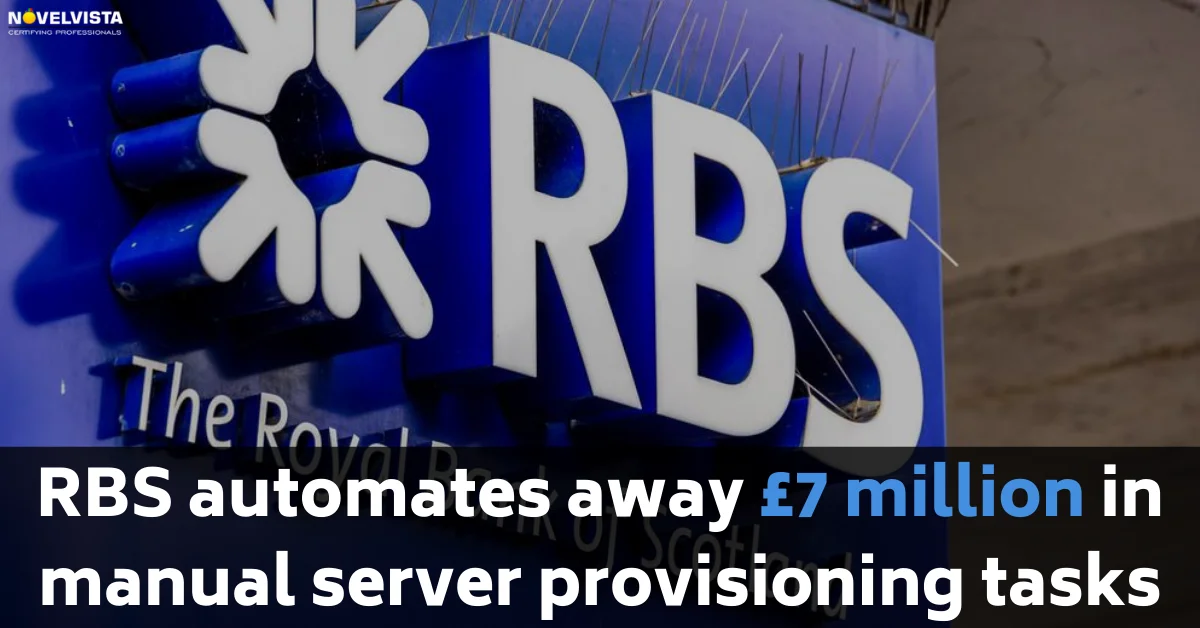Enroll Now and Get Upto 30% Off
* Your personal details are for internal use only and will remain confidential.

Last updated 22/07/2021

The Royal Bank of Scotland (RBS) Group – which will before long be rebranded as Natwest Group under new CEO Alison Rose – has been on a major innovation modernization drive since its administration bailout after the 2007 financial emergency.
A key piece of that strategic accelerating programming conveyance cycles for its interior and client confronting applications, while removing wasteful cycles and expenses via automating endlessly manual server provisioning undertakings, a practice which has truly gotten pace over the bank in the previous three years.
Prior to this initiative, “releases weren’t quick enough,” agreed David Sandilands, infrastructure engineer at RBS, at the time of a recent webinar with the DevOps tool vendor Puppet. “There were lots of projects with fixes and updates having to be applied manually on top of our build. The process was highly manual, with emails and desk drop-ins to ask for pull requests.”
Automation was the conspicuous answer. In any case, to do that adequately, RBS originally expected to grasp a present-day cloud foundation.
In the same way as other financial services organizations, RBS has been consistently moving endlessly from physical workers to more virtualized and cloud administrations – generally private cloud for the present, yet progressively some open cloud framework as-an administration from Amazon Web Services (AWS) and Microsoft Azure, contingent upon the outstanding task at hand. These new stages have empowered RBS to receive mechanization methods that have spared as much as £7 million (almost $9 million) since October 2018.
When Sandilands joined RBS in 2005 the bank was running a huge Unix home spreading over somewhere in the range of 600 physical workers. Specialists at the bank would build up a form and hand a rundown of prerequisites to the tasks group, “kicking off a long period of development until it reached operations, where it was almost too late to review in a hugely meaningful way,” Sandilands stated. “If they found things that weren’t exactly what they needed, that led to either a huge delay to the release or it would be pushed into the next release.”
Absence of perceivability measurements, manual implementation of arrangements by means of shell contents and checks, an absence of repetition and versatility for assembling workers, and a desire for customary form disappointments – prompting a Word record specifying the different issues that frequently happened – illustrates how the commonplace delivery cycle looked. At that point, when worked, there were still weeks-significant delays to go live as staff experienced thorough, manual, fit-for-creation checks.
Today a large portion of the bank's workers run on Red Hat Enterprise Linux (RHEL) and VMware. This move from physical to virtual foundation – and progressively some containerized outstanding tasks at hand – has driven home the requirement for more automation tooling.
This has presented an entire host of new framework as-code tooling into the bank as of late, from Ansible, Terraform, and vRealize to Concourse CI and Chef InSpec.
Accept Puppet for design the board for instance. The bank began little, by exploring different avenues regarding the open-source form of Puppet eight years back, as Sandilands and his group hoped to resolve some significant issues with the bank's delivery measures.
All of these tools have “highlighted how scale has changed from physical to virtual to containers, but the surrounding change management processes still need to happen, which makes clear the case for automation,” Sandilands said.
As it turned out, nonetheless, getting the mindful change supervisory group on board was a test. They had a few concerns with respect to the new tooling, quite a bit of it open source in the good old days.
“The general discussion with them was about the whole pipeline and how all the tools work together to fully test and deliver reliable change,” he described.
To soothe these worries, the bank showed workshops and exhibits work process to work process, apparatus by device, to begin demonstrating that by making littler, very much tried changes, the organizations would in certainty be more secure. This was combined with a drive towards peer-investigated documentation, with Confluence pages and a lot of how-tos being shared over the IT work.
“That marketing part is so critical,” he continued. “We use Facebook Workplace to share demonstrations and run sessions, as well as regular meetings and workshops.”
Talking about Puppet explicitly, Sandilands said that the team most dreaded how Puppet Enterprise could make changes to all servers immediately.
“Deploying something as root creates a major fear for change management and there are huge estate-wide changes happening all at once,” he stated.
“The other big fear was regular small changes because all they heard was ‘more regular change,’ which there was a cultural fear around.”
Also, that automation consistently has employer stability meanings, something Sandilands is acutely mindful of. “The big question we got from project teams often was, ‘Will this mean we lose our jobs?’ No, we move up the stack,” he added.
The difference in approach has helped the bank cut down its interior Service Level Agreement (SLA) for all fit-for-creation tests to finish in three days, down from about fourteen days before the computerization tooling was set up. The desire for RBS is to absolutely mechanize this cycle soon.
The bank's whole codebase has likewise been improved and smoothed out to take a shot at the current foundation, with the Windows bequest decreased from 25,099 lines of code to only 1,680, with full form control and change history. Jira tickets are likewise down hugely as manufactures are conveyed in a more normalized manner, from 201 issues emerging from the last form under the old strategy, down to only four creation affecting issues all the more as of late.
This move has likewise observed the bank adopt a more adaptable strategy to equipment provisioning. Where before it was purchasing physical workers which may lounge around for a considerable length of time or were under-used, presently it charges application groups a day by day rate to utilize a private cloud occasion, which they can get through a list in ServiceNow. The bank was getting 450 IaaS worker demands through that entryway every month last time anyone checked, in September 2019.
This charge-back plan legitimately boosts groups to cut their foundation costs by decommissioning equipment they needn't bother with, removing manual cycles, permitting them to concentrate on their application and get their hands on best-of-breed cloud local tooling.
To validate the move from physical to virtual, and from customary advancement to DevOps, Sandilands and his group gather and offer standard measurements packs around its product discharges, which are imparted to the executives as PDF archives. Being an enormous financial gathering, the cost is continually going to be a key measurement for Sandilands and his group.
Indicating reserve funds – like that feature £7 million figure – and the arrival on venture permits Sandilands and his group to more readily legitimize their push for more automation and recognize key zones for future speculation.
“You have to be able to present back to management to explain what you are getting out of it,” he stated.
His suggestions for other companies making the same shift? “Work out what is hurting you most or what would have the biggest return and focus on that.”
Topic Related PostNovelVista Learning Solutions is a professionally managed training organization with specialization in certification courses. The core management team consists of highly qualified professionals with vast industry experience. NovelVista is an Accredited Training Organization (ATO) to conduct all levels of ITIL Courses. We also conduct training on DevOps, AWS Solution Architect associate, Prince2, MSP, CSM, Cloud Computing, Apache Hadoop, Six Sigma, ISO 20000/27000 & Agile Methodologies.
* Your personal details are for internal use only and will remain confidential.